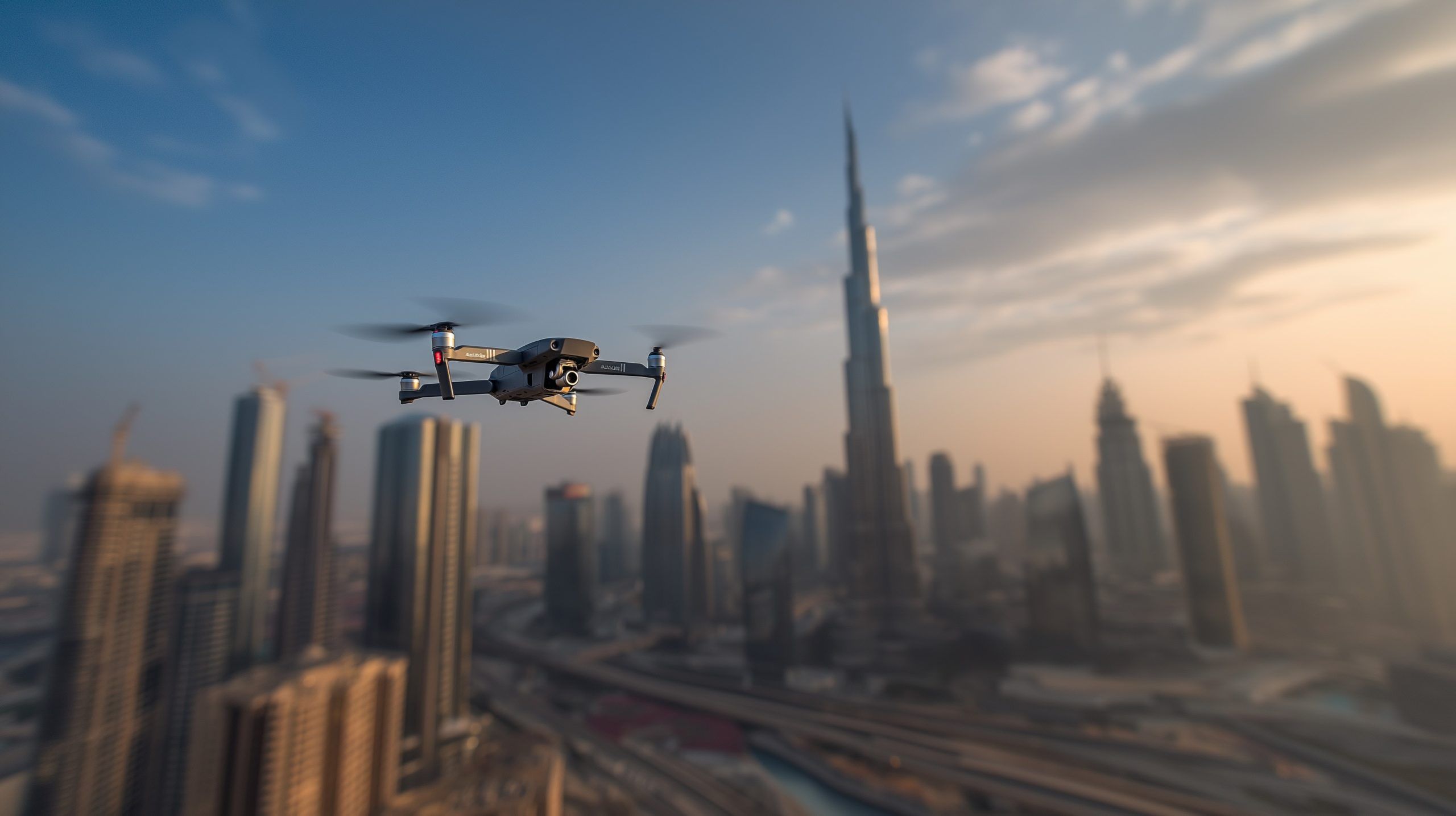- January 7, 2025, the UAE partially lifts the nationwide recreational drone ban, but Dubai keeps its local hobby drone ban in place for now.
- From 2025, all drone pilots—recreational or commercial—must complete a GCAA-approved training and obtain a drone training certificate after a background security clearance of about 3–4 weeks.
- The regulatory framework rests on two authorities: the federal General Civil Aviation Authority (GCAA) and the Dubai Civil Aviation Authority (DCAA), with both sets of rules applying in Dubai.
- Recreational drone use in Dubai is suspended, with the DCAA halting new hobbyist permits; when allowed, hobbyists must register with the GCAA and obtain a DCAA permit before flying.
- Commercial drone operators must obtain a GCAA Unmanned Aircraft Operator Authorization (UOA), hold a valid Dubai Trade License, register each drone with the GCAA, and obtain a DCAA professional-use permit plus mandatory insurance.
- For each commercial flight, operators must obtain a DCAA flight permit or No Objection Certificate (NOC); typical fees are AED 1,500 per flight or AED 5,000 for an event permit, with an advised lead time of at least two weeks and a ~14-working-day SLA for special approvals.
- Higher-risk operations may require extra clearances from Dubai Air Navigation Services (DANS) and, for national-security-related cases, approval from the Ministry of Defense (MOD).
- No-fly zones include a 5 km exclusion radius around airports, with the GCAA Airspace Map showing Green zones for permitted flights and Red/Beige (No-Fly/Restricted) zones, and Pink zones as Prohibited areas; the UAE Drones app provides live warnings.
- Penalties for violations include fines up to AED 100,000, potential imprisonment from 6 months to 5 years, possible confiscation or bans on drone ownership, and prosecution by the UAE Public Prosecution.
- Practical guidance emphasizes using the UAE Drones app/drones.gov.ae for live airspace updates, keeping flight logs, respecting privacy laws, and staying informed as regulations evolve.
Dubai is internationally known for its cutting-edge approach to drone technology – and for having some of the world’s strictest drone regulations droneshop.ae. Drones have grown in popularity for photography, deliveries, and recreation, but Dubai’s authorities tightly control their use to ensure safety and security. If you plan to fly a drone in Dubai, it’s crucial to understand the latest laws governing hobbyist and commercial operations, registration and licensing requirements, no-fly zones, and the steep penalties for breaking the rules. This comprehensive 2025 guide breaks down everything you need to know about navigating Dubai’s drone regulations.
Latest Updates (2024–2025)
Ban Lifted (Partially) After Nationwide Freeze: In 2022, after incidents of drone misuse, the UAE’s Ministry of Interior imposed a nationwide ban on recreational drones thenationalnews.com. After nearly three years, that ban was partially lifted on January 7, 2025. The Ministry of Interior, in coordination with the General Civil Aviation Authority (GCAA), announced that individuals would again be permitted to fly drones under strict new conditions to protect the community and airspace khaleejtimes.com. This marked the end of the blanket ban across six of the seven emirates.
Dubai’s Extra Caution: Notably, Dubai did not immediately lift its local ban on hobby drones. The Dubai Civil Aviation Authority (DCAA) clarified that recreational drone use in Dubai remains suspended “until further notice” despite the federal policy change khaleejtimes.com. In other words, as of mid-2025, private hobby flights are still on hold within Dubai city limits pending further review dubaieye1038.com. DCAA has stated it is “reviewing the situation” and will issue updates when ready dubaieye1038.com. (Commercial and government drone operations, however, have been allowed to continue under approval processes during this period.)
Phased Reintroduction & New Training Requirement: The resumption of drone operations is being rolled out in phases. Late in 2024, the first phase allowed only approved companies and government agencies to operate drones, with personal/hobby flyers to follow in later phases khaleejtimes.com. Alongside this, the GCAA introduced new nationwide requirements: effective 2025, all drone pilots – recreational or commercial – must complete certified training at a GCAA-approved drone academy before flying droneshop.ae. This means obtaining a drone pilot training certificate (after a background security clearance that takes ~3–4 weeks) is now a legal prerequisite to fly anywhere in the UAE droneshop.ae. Authorities strongly encourage users to download the official UAE Drones mobile app (also called “My Drone Hub”) for real-time updates on rules and approved flying zones droneshop.ae. In fact, a new unified national drone platform (accessible via the UAE Drones app and drones.gov.ae) has been launched to handle pilot registrations, flight planning, and instant online approvals for drone operations khaleejtimes.com 1 .
Bottom Line: The drone laws are evolving. The UAE is reopening its skies to drones in a controlled manner – starting with trained, vetted operators and strict oversight. Dubai, in particular, is taking a cautious approach by keeping the hobbyist ban in place a bit longer khaleejtimes.com. Anyone interested in flying a drone in Dubai must be prepared to meet the new training and registration requirements and abide by all regulations once personal drone flying is fully allowed again.
Regulatory Authorities: GCAA and DCAA
Drone operations in Dubai fall under two key authorities: the General Civil Aviation Authority (GCAA) at the federal level, and the Dubai Civil Aviation Authority (DCAA) at the emirate level droneshop.ae. The GCAA sets nationwide drone regulations for the entire UAE – these cover matters like pilot certification, drone registration, airspace rules, and no-fly zones. The DCAA, on the other hand, enforces additional Dubai-specific rules and authorizations within the emirate. In practice, this means drone pilots in Dubai must comply with both the UAE’s general drone laws and any extra requirements imposed by DCAA. For example, the GCAA requires every drone and operator in the UAE to be registered and licensed droneshop.ae, while DCAA may require separate local permits or No Objection Certificates (NOCs) for flights in Dubai. The DCAA also has the power to suspend or modify drone permissions in Dubai for safety – as evidenced by the continued freeze on hobby drones in the city 2 .
Relevant Agencies and Contacts: If you have questions or need approvals, you can reach out to GCAA’s drone division (email: drones@gcaa.gov.ae, hotline 800-4466) or the DCAA in Dubai (call center 800-83222) drone-laws.com. The new UAE Drones Platform (via the mobile app or drones.gov.ae) is now the central portal for registering drones and requesting flight permissions nationwide khaleejtimes.com. Overall, Dubai prides itself on a comprehensive, multi-layered regulatory framework for drones, coordinating federal and local oversight to keep its skies safe 3 .
Hobbyist (Recreational) Drone Use in Dubai
Recreational drone flying – using drones for fun or personal photography – is highly restricted in Dubai. Currently, as noted, all hobbyist drone activity is officially suspended in Dubai pending further notice dubaieye1038.com. For residents and tourists alike, that means you cannot fly a drone in Dubai for leisure purposes until authorities lift the suspension. (In the other emirates, individual hobby flying has been conditionally allowed as of 2025, but Dubai sets its own stricter timeline 4 .)
When Dubai does allow recreational drones again, operators will face strict requirements and pre-flight approvals. Prior to flying, you must:
- Register and Get a Permit: All drones must be registered with the GCAA, and Dubai requires hobbyist pilots to obtain a DCAA drone permit (authorization) before taking off. The DCAA offers an online registration portal where individuals apply, upload their drone details, and pay a small fee. The process is relatively quick – you fill out the form, pay about AED 100 in fees, and often receive instant approval (which you should print and carry) drone-laws.com. However, note that DCAA has halted issuing new hobbyist permits during the ban dubaieye1038.com. No legal recreational flying can occur without this approval in place.
- Complete Mandatory Training: New for 2025, drone pilot training is compulsory for all hobbyists. You will need to complete a GCAA-approved training course and obtain a drone training certificate before you can fly droneshop.ae. In fact, the DCAA will ask for your training certificate (along with drone serial numbers and photos) as part of the permit application drone-laws.com. This ensures every hobby flyer understands the safety rules. Expect the training and security clearance process to take a few weeks, so plan ahead.
- Fly Only in Approved Zones: Dubai strictly limits where you can fly a recreational drone. Drones under 5 kg may only be flown in designated “green zones” — pre-approved flying areas shown in the UAE Drones app/My Drone Hub map drone-laws.com. These tend to be away from populated areas and sensitive sites. You cannot just take off from your backyard or a public park on a whim. In fact, Dubai prohibits drones in public parks entirely to protect people’s privacy thenationalnews.com. Always consult the app’s interactive map for permissible locations and real-time updates before each flight. Flying outside the green zones (into “red” or “restricted” zones) without special permission is illegal.
- Abide by Strict Flight Rules: Even in approved areas, recreational pilots must follow all operational guidelines set by GCAA/DCAA. Key rules include: fly below 400 feet altitude, keep your drone within visual line-of-sight at all times, and only fly in daylight and good weather (no night or poor-visibility flying) drone-laws.com. You must stay well away from any airports, heliports, or aircraft – at least a 5 km radius from any airport’s outer fence is the minimum distance drone-laws.com. Do not fly over or too near to people, buildings, or private property – crowd areas and neighborhoods are off-limits without explicit permission drone-laws.com. Additionally, drones cannot be equipped with any devices to drop or release objects, and using the drone’s camera is only allowed within the designated flying zones (no filming sensitive sites or people without consent) drone-laws.com. Essentially, treat your drone like a small aircraft: yield right-of-way to all real aircraft, avoid hazards, and don’t invade others’ privacy or security. If at any point an manned aircraft (plane or helicopter) is nearby, you must immediately bring your drone down to avoid interference 5 .
- Carry Your Documents: Recreational pilots should have their DCAA approval certificate and registration proof with them when flying drone-laws.com. Enforcement officials may ask to see these. It’s also wise to carry a copy of your training certificate. This documentation shows you’re authorized to fly and aware of the rules.
Compliance Tip: Always use the UAE Drones mobile app when planning a flight. The app will show you live airspace updates (temporary no-fly advisories, etc.) and the latest approved zones droneshop.ae drones.gov.ae. It’s the best way to ensure you only fly where it’s legal on that day. Until DCAA formally reinstates hobby drone flying in Dubai, however, recreational pilots will have to wait a bit longer or fly in other emirates where allowed.
Commercial Drone Use in Dubai
Flying a drone for commercial or professional purposes (such as aerial photography/videography services, inspections, deliveries, event coverage, etc.) is legal in Dubai, but very tightly regulated. Businesses and organizations must go through several steps to lawfully operate drones, and multiple authorities are involved in granting approvals. Commercial drone operators in Dubai are required to:
- Obtain a Drone Operator License (UOA): Companies or organizations must first register with the GCAA and obtain an Unmanned Aircraft Operator Authorization (UOA) – essentially a drone operator’s license at the federal level. This involves applying to the GCAA with corporate documents, including security clearance from the GCAA for the organization and personnel drone-laws.com. You’ll need to submit a formal letter on company letterhead and subscribe to GCAA’s e-publication service (annual fee ~AED 1,200) as part of the process drone-laws.com. The turnaround time is about 3 weeks to get the UOA, assuming all requirements are met drone-laws.com. Note: Obtaining the UOA does not by itself let you fly; it’s a prerequisite certification of your organization as a drone operator.
- Have a Dubai Trade License: The DCAA now mandates that any entity applying for drone flight permits in Dubai must hold a valid Dubai trade license (i.e. be a registered business in Dubai) droneshop.ae. This was a policy change to ensure accountability – effectively, only registered companies can conduct drone operations, not informal or unlicensed individuals. So, if you’re a foreign or non-Dubai company, you’d need to partner with a Dubai-licensed entity or obtain a license to operate there.
- Register Drones and Get Insurance: Just like individuals, all drones used commercially must be registered with the GCAA. In addition, the DCAA requires commercial operators to register on its platform and obtain a permit for professional use (similar to the hobby registration but for businesses) drone-laws.com. Each drone’s details (make, model, serial) will be recorded. Also drone liability insurance is mandatory for commercial flights in Dubai drone-laws.com. Insurance helps cover any damages in case of an accident – a necessary safeguard when doing higher-risk operations for business.
- Apply for Flight Permits (NOCs) for Each Operation: Beyond the operator license and drone registration, every actual drone flight or project in Dubai requires a permit from DCAA. Commonly this is in the form of a No Objection Certificate (NOC) for the specific operation. DCAA provides online application portals for different scenarios – for example: a Commercial Drone Use NOC (for general professional drone flights or demo projects) and an Event Drone Use NOC (for using drones at events/shows) drone-laws.com drone-laws.com. You must submit details of the intended flight (location, time, purpose, drone specs, pilot credentials, etc.). The applications come with fees – currently AED 1,500 per commercial flight request (plus small admin fees) drone-laws.com, or AED 5,000 for a permit to fly drones at an event drone-laws.com. Once you apply and pay, the request is reviewed by DCAA (and potentially other stakeholders like air traffic control). Standard flights in unrestricted areas might be approved fairly quickly, whereas anything unusual takes longer. It’s wise to apply at least two weeks in advance, as DCAA notes about 14 working days SLA for special operational approvals 6 .
- Get Additional Clearances for Restricted Zones or Special Cases: If your commercial drone activity involves higher-risk factors – e.g. flying above the normal altitude limit, in a sensitive location, or for unique purposes – you will need extra sign-offs. Dubai Air Navigation Services (DANS) now oversees clearances for flights that require exceptions (such as altitude above 400 ft or within restricted zones). In practice, this means you may need a DANS No Objection letter or clearance in addition to DCAA’s permit for such operations droneshop.ae. Similarly, if any drone operation has national security implications (for example, aerial filming in certain areas), you must have approval from the UAE Ministry of Defense (MOD) before proceeding droneshop.ae. The MOD is generally involved in vetting commercial drone uses, especially those involving photography or long-range drones, to ensure no security laws are breached. In summary, sensitive operations require coordination with multiple authorities – DCAA, DANS, GCAA and sometimes MOD – before you can launch. Always specify the nature of your operation clearly during the application so the relevant NOCs can be obtained.
- Operational Constraints: Commercial drone pilots in Dubai must follow similar flight rules as hobbyists (400 ft ceiling, line-of-sight, daytime only, etc.) unless special permission is given otherwise drone-laws.com. DCAA may impose specific conditions on your permit (e.g. limiting the flight to a certain zone or requiring a spotter). Also, Remote ID technology is not yet required in the UAE, so currently there’s no mandate to broadcast your drone’s ID in flight drone-laws.com – but keep an eye on this, as regulations worldwide are heading toward Remote ID in the future. All data capture (photography/videography) must respect UAE privacy laws and you should avoid sensitive areas unless explicitly allowed.
Once you have all necessary approvals, you are expected to strictly stick to the approved plan (location, time, altitude, etc.). Dubai’s authorities conduct surveillance and have strict enforcement for drone activities, especially in urban areas and near critical infrastructure. Commercial operators who prove reliable and compliant will find it easier to work on future projects, whereas any breach could lead to permits being revoked.
Examples: Commercial drone use in Dubai is diverse – drones are employed for aerial filming, real estate and tourism photography, infrastructure inspections, agricultural monitoring, public safety, drone light shows, and more. The GCAA categorizes many of these as “special operations” that are allowable with the right approvals drone-laws.com. For instance, media production companies frequently use drones for filming (with permits), and Dubai has even trialed drone delivery services under strict supervision. The key is that each use case must go through the proper channels; flying a drone for profit or business without a license or permit is treated as a serious offense.
No-Fly Zones and Airspace Restrictions in Dubai
Dubai maintains very tight control over its airspace. There are extensive no-fly zones and restricted areas where drones cannot be operated freely. All drone pilots (recreational and commercial alike) must be aware of these and plan flights accordingly:
- Airports and Aircraft: It is absolutely forbidden to fly a drone near airports or aircraft. UAE regulations explicitly ban drone flights within 5 kilometers of any airport, airfield, heliport, or helicopter landing site drone-laws.com. This rule covers major airports like Dubai International (DXB) and Al Maktoum (DWC), as well as smaller airstrips and helipads (e.g. hospital heliports, police helipads). Dubai’s dense air traffic means any drone in vicinity can pose a huge hazard. Violating the 5 km rule (even unintentionally) will lead to immediate enforcement action. Similarly, you must not fly if there’s any manned aircraft in the area – if a plane or helicopter approaches, land your drone at once 5 .
- City and Sensitive Locations:Downtown Dubai and other sensitive areas are largely off-limits without special permission. The airspace around government buildings, royal palaces, military bases, embassies, power plants, and other critical infrastructure is typically designated as restricted or prohibited. For example, flying anywhere in proximity to military sites or over security-sensitive zones is banned unless you have high-level clearance droneshop.ae. Even some public areas have special restrictions – as mentioned, Dubai bans drones over public parks and beaches to protect privacy and safety thenationalnews.com. Heavily populated districts are generally no-fly zones for hobbyists. Always assume that if an area seems sensitive or crowded, you cannot fly there without asking authorities.
- GCAA Airspace Map – Red, Beige, Pink Zones: The GCAA provides a color-coded drone map (via the app or website) highlighting flying zones across the UAE. On this map, “Green” zones are safe for drone use (for authorized pilots) whereas other colors indicate restrictions. In particular, Red and Beige zones are categorized as No-Fly/Restricted areas – no drone operations are allowed there unless you have advance approval from GCAA gcaa.gov.ae. These might cover approach paths to airports, strategic locations, or certain boundaries. Pink zones are the highest level – Prohibited areas – where no drone flying or filming is allowed at all, no exceptions gcaa.gov.ae. If an area is marked Pink, even the authorities won’t grant a permit for it under normal circumstances. Pilots must familiarize themselves with these zones; flying into a red/beige zone without clearance or into any pink zone will result in enforcement action. The UAE Drone app will show your live location relative to these zones and issue warnings if you’re near one droneshop.ae. Always check it before and during your flight.
- Altitude and Line-of-Sight Limits: The general maximum altitude for drones in Dubai is 400 feet (120 meters) above ground level drone-laws.com (unless explicitly allowed higher for a specific operation). This keeps drones well below manned aircraft flight paths. Additionally, you cannot fly above the pilot’s visual line-of-sight range – no using FPV beyond visual range or autonomous long-distance flights, again unless specially approved drone-laws.com. Most hobby flights should stay much closer than the maximum limits anyway, especially in designated parks or desert flying zones. Also note, night flying is prohibited without special clearance; operations should be in daylight hours only 7 .
- Indoor vs Outdoor: Interestingly, flying a drone indoors (e.g. inside a closed stadium or sound stage) is not subject to the same aviation rules since it’s not in public airspace. However, indoor drone use might require venue permission and safety measures. Outdoor open-air flying is where all the above laws apply.
To summarize: Dubai’s legal drone flying areas are limited and clearly defined. Most of the city and its surroundings are either restricted or require case-by-case permission to enter. Legal hobbyist flying will be confined to a few safe zones (likely in desert or open areas away from the city). Commercial operators, even with permits, must be very mindful of restricted airspace and typically coordinate with air traffic authorities (DCAA/DANS) for any operations near controlled zones. Always err on the side of caution – if unsure about an area, assume it’s a no-fly zone until you verify otherwise on official maps or with authorities 8 .
Penalties for Illegal Drone Operations
Dubai enforces its drone laws with zero tolerance – the penalties for non-compliance are severe, reflecting how seriously authorities take airspace safety and security. If you break the drone rules, you could face one or more of the following consequences:
- Hefty Fines: Financial penalties can range from a few thousand dirhams for minor infractions up to AED 100,000 (≈$27,000) or more for major violations aviationguideem.com. For example, during the 2022 ban, anyone caught flying a drone could be fined Dh100,000 under the Ministry of Interior’s order thenationalnews.com. Even outside of a ban, operating a drone without the proper license or in a prohibited area can easily incur tens of thousands of dirhams in fines. These fines are often accompanied by confiscation of your drone equipment.
- Imprisonment: Serious breaches of drone laws are treated as criminal offenses. UAE prosecutors have warned that offenders may face jail sentences from 6 months up to 5 years for egregious cases thenationalnews.com. Flying a drone that endangers an aircraft or public safety, or violating a government ban, falls in this category. It’s not just a theoretical risk – the law (Article 70 of the Civil Aviation Law) provides for imprisonment for operating a drone without authorization in restricted airspace khaleejtimes.com. Dubai Police and aviation authorities will not hesitate to pursue jail time for drone pilots who cause a major incident or show reckless disregard for the rules.
- Drone Confiscation and Bans: At a minimum, if you’re caught flying illegally, authorities will seize your drone on the spot. You may lose the device permanently. You could also be banned from future drone ownership or operation in the UAE, especially if found guilty of a serious violation. Because all drones have to be registered, an offender’s registration can be canceled, preventing them from legally obtaining new permits.
- Legal Prosecution: Offenders can be taken to court. The UAE Public Prosecution has made it clear they will prosecute those who breach drone laws, under charges that may include endangering aviation or public safety. A conviction would go on your record, which can affect future travel, employment (especially in UAE), etc. In short, it’s not worth the risk.
Dubai’s authorities have repeatedly issued warnings to deter illegal drone use. In one public advisory, Dubai Police cautioned that flying drones without official authorization can lead to “jail time and/or stiff penalties of up to Dh100,000” aviationguideem.com. The DCAA and GCAA also urge the community to report any rogue drone activities. Enforcement is stepped up whenever incidents occur – for example, after drones were spotted in unauthorized areas, Dubai launched “strict implementation” drives to catch violators, emphasizing registration, training, and adherence to permitted zones 9 .
Mandatory Reporting of Incidents: Note that if you are flying legally and something still goes wrong (e.g. you crash your drone or lose control of it), you are required to inform authorities immediately. The GCAA has a hotline (+971 50 641 4667) and email (aai@gcaa.gov.ae) for incident reporting aviationguideem.com. Promptly reporting a lost drone or accident can help retrieve the drone and demonstrates your compliance; failing to report an incident that could pose a risk is itself an offense.
Overall, the cost of violating Dubai’s drone laws is extremely high, both in monetary terms and personal consequences. By contrast, complying with the rules is relatively straightforward – it might involve some paperwork, fees, and patience, but it keeps you on the right side of the law. Always err on the side of safety and legality. If unsure about any regulation, seek clarification from the GCAA/DCAA before flying. The authorities have made it clear that they will enforce these laws to the fullest extent to protect Dubai’s skies 8 .
Flying Legally: Tips to Stay Compliant
Staying within the law will allow you to enjoy drone flying in Dubai (or run your drone business) without trouble. Here are final key tips for safe and legal drone operation as of 2025:
- Complete All Required Steps First: Make sure you’ve registered your drone and obtained the necessary license/permit (hobbyist authorization or commercial UOA and NOC) before you fly. Keep digital and hard copies of your approvals when out in the field drone-laws.com. If your activity requires multi-agency clearance (e.g. DCAA + DANS + MOD for a complex operation), do not launch until you have all of them in hand.
- Use Official Tools: Leverage the UAE Drones app / drones.gov.ae platform for guidance. These tools provide live maps of fly zones, real-time airspace updates, and digital flight approval requests drones.gov.ae. For instance, if you plan a flight near controlled airspace, you can submit your mission plan through the app and often get immediate clearance or denial digitally drones.gov.ae. The app will also inform you of temporary no-fly notices (for events, VIP movements, etc.). Using these resources is the best way to ensure you’re always flying in a legal area.
- Follow the “Rulebook” Every Flight: Adhere to altitude limits, distance rules, and timing restrictions every single time you fly. Don’t get complacent even after you’ve flown many times. All it takes is one mistake (e.g. straying into a no-fly zone or taking your drone up too high) for authorities to intervene. Remember that many drones record flight logs – if investigated, those logs can be examined for violations.
- Respect Privacy and Courtesy: Even in allowed zones, be mindful of not capturing footage of people without permission or trespassing onto private property from above. UAE has strict privacy laws, and drone usage must not violate them drone-laws.com drone-laws.com. If someone approaches you with concerns while you’re flying, be courteous and land the drone if needed. It’s better to diffuse any tension, as the next call they make could be to the police if they feel threatened by the drone.
- Stay Informed: Drone regulations can and do change. Dubai’s drone framework is actively being updated as technology evolves. For example, new rules about drone deliveries or future requirements like Remote ID could be introduced in coming years. Keep yourself updated through official channels – the GCAA website, DCAA notices, and reputable news sources. As of mid-2025, the situation for hobbyists is still in flux (await DCAA’s announcement on lifting the suspension). By staying informed, you can adjust to new rules seamlessly and avoid any unintentional violations.
In conclusion, Dubai welcomes innovation with drones but under a firm regulatory umbrella. Hobbyists should be prepared to meet training and permit requirements once recreational flying is allowed again, and to fly only in safe zones. Commercial operators have significant opportunities in Dubai’s dynamic market, provided they navigate the licensing and approval process diligently. By following the guidelines above and obtaining the proper clearances, you can enjoy the benefits of drone technology in Dubai legally and safely, while capturing those stunning aerial views of this iconic city without running afoul of the law. Always when in doubt, consult the official resources or contact the authorities – it’s better to ask first than to face penalties later khaleejtimes.com. Safe flying!
Sources: Official UAE drone regulations and announcements khaleejtimes.com droneshop.ae; Dubai Civil Aviation Authority guidelines drone-laws.com drone-laws.com; GCAA UAV advisory documents gcaa.gov.ae gcaa.gov.ae; news reports on 2025 regulatory updates dubaieye1038.com dubaieye1038.com; Dubai Police and GCAA public safety warnings aviationguideem.com 10 .






